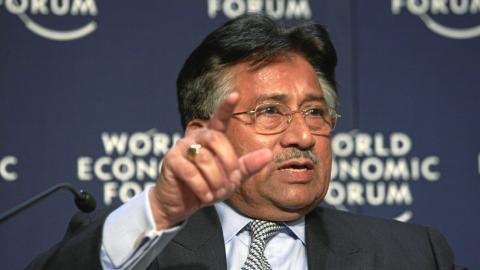Pakistan’s fourth military ruler, the late General Pervez Musharraf, was a man of paradoxes. He said and did some right things, but could not always translate his rational-sounding pronouncements into policy. The contradiction between Musharraf’s avowed goals and the reality that he presided over confused some and frustrated others.
History will probably view him as a Pakistani patriot, limited by prejudices inculcated in the country’s military officer class.
The Clash between Intention and Implementation
Musharraf publicly said that Pakistanis should not be India-centric in their worldview but periodically reasserted the claim that India was a permanent threat to Pakistan’s existence. His proclamations about ‘enlightened moderation’ were contradicted, on one occasion, by the arrest of over a thousand people under a counter-terrorism law for flying kites in the province of Punjab.
Musharraf talked about building sustainable democracy but continued to rule with the help of the Pakistan Army and the country’s intelligence services. “The army is my second skin,” he once declared. His claim of supporting stability in Afghanistan was often accompanied by outbursts against the former republic. The General was not only a linchpin in America’s global war against terrorism but also allowed Pakistani terror groups to continue in business.
General Musharraf’s admirers argue that he was a well-intentioned leader. His inconsistencies were not the result of a Machiavellian psyche bent upon confusing the world. They were the product of confusion about ends and means within a mind that internalised all the prejudices of Pakistan’s cantonment culture.
In that culture, the Pakistan Army is the sun, around which all other objects that are part of the solar system called Pakistan revolve. Setting Pakistan right is the duty and privilege of the army and its commanding General. If Musharraf violated the country’s constitution, it was not a big deal for the cantonment wallahs. He was acting only to save Pakistan from its ‘corrupt’ politicians.
In the years after his 1999 coup d’etat, Musharraf was forced to interact extensively with the civilians he grew up to hold in contempt. From these civilians, he learnt much, including soundbites and clever-sounding phrases. These catchwords allowed the General to articulate a vision of tolerance and realism. Musharraf most likely believed this vision. But he also believed simultaneously in the Pakistan Army’s deep-rooted prejudices. That, more than anything else, was why Musharraf’s stated vision did not always translate into action.
Musharraf’s Contradictory Positions
Let us examine a few examples of Musharraf’s contradictory positions. He asserted that he wanted peace with India and wanted Pakistanis to change their India-centric worldview. But he did little to examine or change the sources of Pakistan’s India obsession. In his mind, India was still the eternal enemy and Jammu and Kashmir the unresolved business from Partition. With that focus, how he expected Pakistanis to change their attitude toward India remains a mystery.
Within a few days of using the term “Indo-Centric” to describe Pakistan’s traditional view of India, Musharraf told troops at the Bahawalpur garrison that his government was taking all possible measures to provide state-of-the-art weapons and equipment to the armed forces to maintain a qualitative edge against the country. He criticised the civil-nuclear deal between the United States and India as a threat to the balance of power in the region.
The India-centric view of Pakistanis flows from the centrality of the army in their lives and the continuous projection of an Indian threat in almost all public discourse. Musharraf’s deeply held prejudice that the army’s pre-eminence in Pakistani life could not be compromised led to the dichotomy in calling for abandoning the obsession with India and promising to maintain the balance of power against it at the same time.
The conflict in Musharraf’s vision was even more evident in domestic matters. Musharraf’s promises of sustainable democracy could not be fulfilled as long as the security services controlled and managed the political process. He tried his best to keep former prime ministers Benazir Bhutto and Nawaz Sharif out of politics while simultaneously saying that he had nothing against Pakistan’s mainstream political parties—the Pakistan Peoples Party (PPP) and the Pakistan Muslim League-Nawaz (PML-N).
Musharraf rightly criticised Pakistan’s political parties for not practising internal democracy but could never explain how parties could freely choose a leader if the army high command vetoed the right of specific politicians to participate.
Even Musharraf’s explanation for the 1999 coup was paradoxical. It was then Prime Minister Nawaz Sharif’s attempt to replace Musharraf from the office of army chief that reportedly triggered the coup. An elected prime minister was said not to have the right to change an army chief whom he had appointed. But as a military ruler, Musharraf claimed for the army chief the right to decide who was or wasn’t eligible to head political parties of which a serving army officer could not be a member.
In a BBC interview in 2006, Musharraf asserted that there was no contradiction between the military’s control over the levers of power and building democracy in Pakistan. “The military here plays a great role, in stabilising, in maintaining the stability and integrity and progress of Pakistan,” he declared.
In the same interview, he insisted that he knew “200 per cent that the people of Pakistan are with me, the vast majority.” But the General did not feel the need to explain why he refused to run in a contested presidential election under Pakistan’s constitution.
That disregard for the constitution and legal processes will be remembered as Musharraf’s legacy long after his accomplishments in temporarily improving Pakistan’s economy and building better foreign relations have been forgotten.















